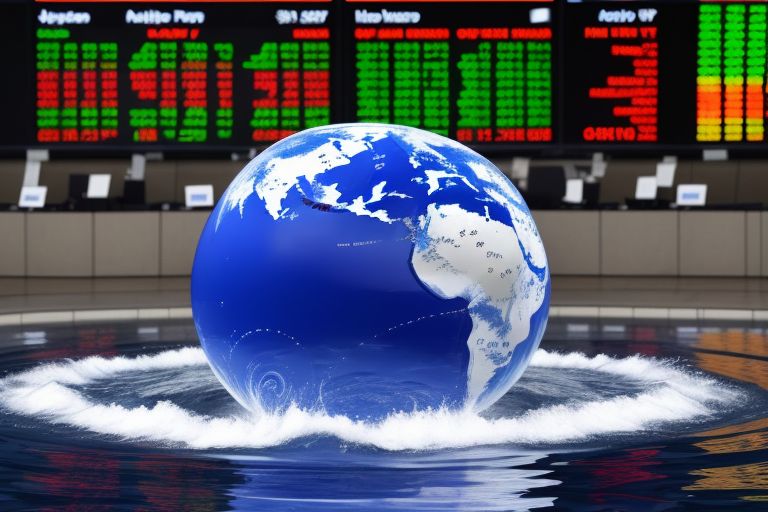Geopolitical risks have always defined global financial markets; disturbances in certain countries related to politics, conflicts or perhaps sudden policy changes are felt around the world. Investors become very cautious with geopolitical risks, thus making a change in stock prices, bond yields, and currency values. This article is based on real-world data and examples focusing on how these risks affect global markets.
Understanding Geopolitical Risks
Geopolitical risks simply refer to political events or tensions between nations. Such geopolitical risks result from wars, sanctions, trade, or even regime changes. Since the world is interconnected, what happens in one country does indirectly affect the economies of others. For example, intercontinental trading between the US and China, tends to result in market uncertainty as well as increased market volatility.
How Geopolitical Risks Impact the Stock Markets?
Geopolitical events highly affect stock markets. In the case when investors feel uncertainty in the economy, they usually place money in safe and conservative investments like bonds or gold instead of taking risks. The surprising turn often makes stock markets plummet overnight. The US-China war during 2018-2019 created huge ructions in the global market. Over the period, the US levied tariffs on goods imported into this country from China. The news sparked shock waves among investors over a potential slowdown of global trade. The S&P 500 fell about 7% in just a few days in December 2018.

In another case, Goldman Sachs studied the geopolitical impacts on stock markets, where it was reported that if a significant incidence occurs within a month, then this could lead to a loss of 5%. More sensitive, as stated above, the Middle East markets may be because there, the price of oil is also tied to political stability.
Currency Fluctuations and Geopolitical Risks
The currency markets are particularly vulnerable to geopolitical risks. The investors with the nature of risk aversion are likely to flock to safe haven currencies such as the US Dollar, Japanese Yen or Swiss Franc during the times of crisis. Their own currencies depend again upon the source of the risk-lose in value, this time mainly those of emerging market economies.
We have seen that after the 2016 Brexit referendum, British Pound (GBP) dropped more than 10% in a matter of days against the US Dollar. There was a massive sell-off in currency markets due to uncertainty pertaining to Britain's decision to exit from the European Union. Since then, the long-term impact of Brexit on the British economy continues to plague the pound. The latter has never fully made up for its pre-referendum levels. According to J.P. Morgan, currency markets experience swings up to 2% in a single day when geopolitics are extremely dangerous. Emerging market currencies take an even harder fall with drops as high as 3% to 5%, and that is not uncommon when massive events occur.

Commodity Price Impact
The geopolitical events have influenced the pricing of basic commodities such as oil, natural gas, and gold. For instance, oil prices go up in the event of high tension in the Middle East, which is commonly regarded as the reserve of the majority of the world's oil supply. It is the same in the case of geopolitical crises where investors perceive gold as a safe haven. It can be evident in the time of 2020, when tension between US-Iran surged the oil prices nearly 5% in a mere 48 hours. News related to disruption in the Middle East regarding the possible supply of oil arbitrated a sudden surge in demand for oil futures at higher prices. As per Bloomberg, for every ten dollar hike in oil prices, there is an ensuing reduction of 0.2% in world's GDP. It is more severe in the countries where the imports of oil constitute a heavy chunk of their imports as energy costs rise over there.
Geopolitical Risk and Impact on Bond Yields
Another source of reaction from bond markets is the geopolitical risks. Investors draw money when they expect the world economy to contract and hence move to safer investments such as government bonds. This causes a demand for the bonds; it further lowers the yields while reflecting a decreased risk involved in holding government debt.
It is an example of the time when in 2014, Russia annexed Crimea and tensions rose in Europe, and investors flocked to the security of US Treasury bonds in anticipation that the war may spill over elsewhere. This resulted in the yield on 10-year US Treasuries falling from 2.8% at the beginning of 2014 to approximately 2.3% at the end of the same year. It proves that geopolitical risks can even drive bond yields down in the short term by an extent of 0.5%. The global flight to safety leads to an increase in government bonds demand, pushing their yields lower and pushing prices higher.
Geopolitical Risks and Behaviour in the Long Run
While some effects may be more evident immediately, geopolitical risks also influence the long-term trends in markets. Investments are often delayed in areas where a political stalemate prevails. Supply lines can be disrupted thus raising costs among organizations. An example could be the US and China trade tensions having forced most multinational firms to rethink their supply chain strategies, which is likely to alter global trade patterns for decades to come.
Reducing the Effects of Geopolitical Risks
Investors have several strategies to reduce the effect of geopolitical risks. An important strategy is diversification. Diversifying investment of oneself across several classes of assets and regions can significantly lower the leverage to a single geopolitical event. Other financial instruments such as options and futures hedge a portfolio from sudden and violent market movements.
Following the current events is also to be done. Investors who observe all geopolitical events closely can make appropriate adjustments in their portfolios timely, thereby moving assets into safer investments when risk is more probable.
Strategy for Investors to Protect Portfolio and Grow
Geopolitical risks are a reality of global financial markets. They have the potential to cause sudden price shocks in stocks, currencies, commodities, and bonds in a country. For investors, these risks bring difficulties, but for those prepared ahead of time, they present an opportunity to operate and grow their portfolios. Simply by getting a feel for the way geopolitical risks make ripples in the global markets and having the correct strategies, an investor can hedge against uncertainty and protect the portfolio.






